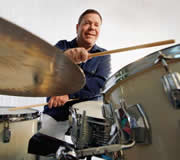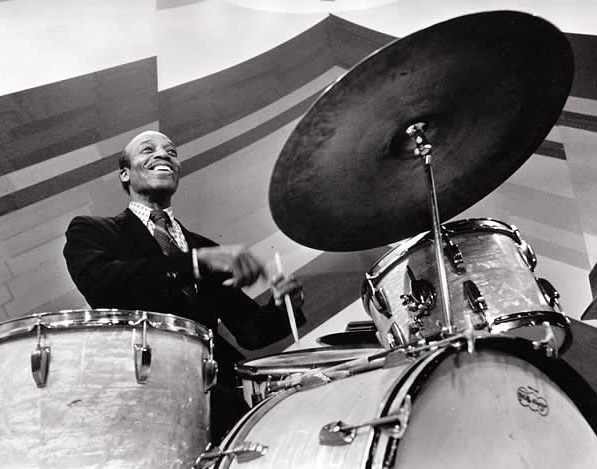“BACKSTAGE” with Bruce Klauber: October, 2014 Edition
Wednesday, October 1st, 2014“BACKSTAGE” with Bruce Klauber: October, 2014 Edition
“Backstage” is a continuation of a column that has been published regionally, and syndicated nationally, since 1978. The column is intended to be a quirky and personal take—someone I once knew described it as “snarky,” whatever that means—on popular culture, books, news of our area’s arts scene, what is and isn’t going on in Atlantic City, and whatever else lands on my desk that I deem to be newsworthy, appropriate and/or slightly absurd. As a journalist and a performer, hence the name “Backstage,” I hope I bring a unique perspective to matters serious and not so serious. I welcome your comments and also your news via drumalive@aol.com. Welcome. And enjoy.—Bruce Klauber.
It’s Labor Day weekend in Atlantic City. The Philadelphia-to-A.C. train is sold out, the beach, Boardwalk, Margaritaville at Resorts, and Steel Pier are mobbed; and venerable restaurants like Tony’s Baltimore Grill and White House Subs have lines going out in the street. A visiting, out-of-touch outsider would have no idea that this town is in serious jeopardy. At day’s end, the 27-year-old Showboat hotel/casino will shut its doors. Tomorrow, Revel hotel/casino, open for just a bit over two years and built at a cost of $2.4 billion, will also close. There’s very little action at Revel this day, not even the curiosity seekers—or as Mel Torme’ might have called them, “The butchers, the bakers, the let ‘em eat cakers”– are here. Walking through this overgrown and overbuilt behemoth once again, it’s clear that the experts who have said “it never should have been built” were correct. There’s not much more action down the boards at the Showboat on its last day of operation, or at the neighboring Taj Mahal, which will likely be the next to close. But business picks up considerably, save for the doomed and decrepit Trump Plaza, once I reach Bally’s and Caesars. Indeed, at the Tropicana, the last hotel/casino on the Boardwalk, business was booming. Those visiting Borgata and Golden Nugget told me they were mobbed. As for the future? Sports betting has finally been legalized, which will be a help, and it appears that for the moment, the “great casino shakeout” is over, meaning more business for the six remaining gaming venues. Revel will become something, likely a gigantic entertainment complex, much needed in the city. That the non-gaming spots were packed with families certainly says something, meaning that it is perhaps due time that Atlantic City re-invent itself as a year-round family destination. The lesson to be learned via all that’s happened here? Don’t try to make this place into something it isn’t and likely will never be. See you next summer.
Ginger Alden, Elvis Presley’s last girlfriend, hasn’t said much since the passing of The King since he left the building in 1977. Now she’s saying plenty, as she has a new book out called, not surprisingly “Elvis and Ginger” (Berkley Hardcover). The best that can be said about it is that Elvis gets top billing. In interviews hyping the book, the “author” has come up with at least two incredible revelations: That The King really died of chronic constipation and that his death was “unexpected.” Interesting. Was it possible that Alden couldn’t see that something was amiss when a 300-pound man was stumbling around the stage and crying out for a fix? Unexpected, indeed.
In 1961, then CBS News President Fred Friendly described a good deal of television programming as a “vast wasteland.” While that is certainly not the case today, there’s still a lot of waste on the air, including the RFD network, which specializes in airing reruns of “Hee Haw.” Viewers who want to see such things will be seeing more RFD TV, as the network will now be carried by AT&T and will be available in 46 million homes. Including those in Mayberry. And we thought we were done with Goober and Gomer.
Major house-cleaning at Pennsylvania Ballet. Artistic Director Jeffrey Gribler, on hand since 1975, is history, as is long-time ballet mistress Tamara Hadley, Ballet School Director William DeGregory, and Artistic Director Assistant Michael Sheridan. The firings were said to have been the result of a report by arts consultant Michael M. Kaiser, who indicated that the company is no longer in the “top ranks” of American ballet companies. Spanish dancer Angel Corella is the new Artistic Director. Info the company’s 51st season: paballet.org.
Was it embarrassment, generosity or both? The near-dead, foreclosed upon and up-for-sale Suzanne Roberts Theatre, home of the Philadelphia Theatre Company, may be rescued by none other than the Roberts family who has pledged—if certain changes are implemented–$2.5 million in cash. Season details: philadelphiatheatrecompany.org.
In other non-payment news, guess who owes the Philadelphia Police Department $108,000 for security the police department provided from 2009 to 2012? The Mann Center for the Performing Arts. But the Mann folks shouldn’t feel that bad. The Philadelphia Phillies owe the cops $275,000.
Philadelphia’s Giovanni’s Room, the country’s oldest LGHT bookstore, was very close to closing its doors earlier in the year, but has been given a new lease on life. The Philly Aids Thrift has signed a two-year lease with the former owner, and the “new” Giovanni’s will open officially on October 10.
Accordions are in the news again: Police received a call last month about a suspicious package standing next to a trash can at the front door of the Whole Foods Market in Plymouth Meeting. Turned out, police said, that the package was a “suspicious accordion.” No comment on this from “Weird Al Yankovic.
There’s little basis in fact to reports that “Skinny Joey” Merlino, believed to be a former Philadelphia crime boss and out on parole since being released from prison in 2011, will open a restaurant in Boca Raton. There’s a chance that “Skinny Joey” may go back in the can again for parole violations.
This just in: The much hyped “advance ticketing policy”– for a $325 per person dinner at Jose Garces’ Volver within the Kimmel Center—has been discontinued. Reason? Few folks wanted to have dinner at that price within the 34-seat space. Volver is now going the “lower-priced options” route. This scenario seems similar to the marketing disaster that was Atlantic City’s Revel. The lesson to be learned here is simple: Know your market.
NOTE: “Backstage” can also be read in its entirety on the jazzlegends.com Facebook Page.






